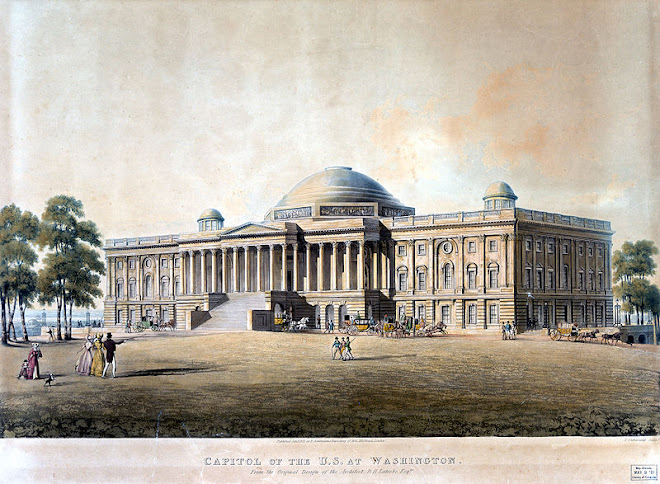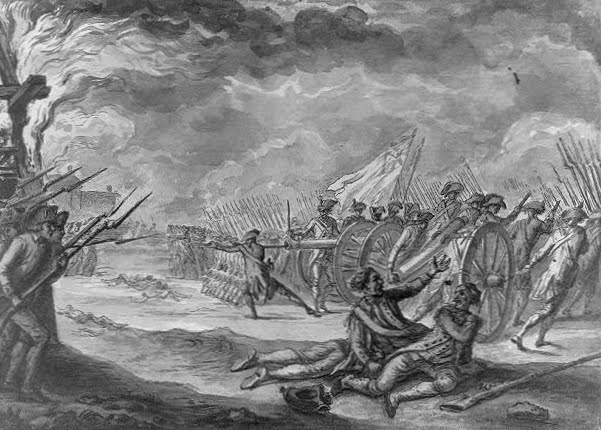From Human Events--Guns & Patriots:
Federalist No. 74
by The Federalist Papers
05/17/2011
The Command of the Military and Naval Forces, and the Pardoning Power of the Executive
New York Packet
Tuesday, March 25, 1788.
To the People of the State of New York:
THE President of the United States is to be "commander-in-chief of the army and navy of the United States, and of the militia of the several States WHEN CALLED INTO THE ACTUAL SERVICE of the United States." The propriety of this provision is so evident in itself, and it is, at the same time, so consonant to the precedents of the State constitutions in general, that little need be said to explain or enforce it. Even those of them which have, in other respects, coupled the chief magistrate with a council, have for the most part concentrated the military authority in him alone. Of all the cares or concerns of government, the direction of war most peculiarly demands those qualities which distinguish the exercise of power by a single hand. The direction of war implies the direction of the common strength; and the power of directing and employing the common strength, forms a usual and essential part in the definition of the executive authority.
"The President may require the opinion, in writing, of the principal officer in each of the executive departments, upon any subject relating to the duties of their respective officers." This I consider as a mere redundancy in the plan, as the right for which it provides would result of itself from the office.
He is also to be authorized to grant "reprieves and pardons for offenses against the United States, EXCEPT IN CASES OF IMPEACHMENT." Humanity and good policy conspire to dictate, that the benign prerogative of pardoning should be as little as possible fettered or embarrassed. The criminal code of every country partakes so much of necessary severity, that without an easy access to exceptions in favor of unfortunate guilt, justice would wear a countenance too sanguinary and cruel. As the sense of responsibility is always strongest, in proportion as it is undivided, it may be inferred that a single man would be most ready to attend to the force of those motives which might plead for a mitigation of the rigor of the law, and least apt to yield to considerations which were calculated to shelter a fit object of its vengeance. The reflection that the fate of a fellow-creature depended on his sole fiat, would naturally inspire scrupulousness and caution; the dread of being accused of weakness or connivance, would beget equal circumspection, though of a different kind. On the other hand, as men generally derive confidence from their numbers, they might often encourage each other in an act of obduracy, and might be less sensible to the apprehension of suspicion or censure for an injudicious or affected clemency. On these accounts, one man appears to be a more eligible dispenser of the mercy of government, than a body of men.
The expediency of vesting the power of pardoning in the President has, if I mistake not, been only contested in relation to the crime of treason. This, it has been urged, ought to have depended upon the assent of one, or both, of the branches of the legislative body. I shall not deny that there are strong reasons to be assigned for requiring in this particular the concurrence of that body, or of a part of it. As treason is a crime levelled at the immediate being of the society, when the laws have once ascertained the guilt of the offender, there seems a fitness in referring the expediency of an act of mercy towards him to the judgment of the legislature. And this ought the rather to be the case, as the supposition of the connivance of the Chief Magistrate ought not to be entirely excluded. But there are also strong objections to such a plan. It is not to be doubted, that a single man of prudence and good sense is better fitted, in delicate conjunctures, to balance the motives which may plead for and against the remission of the punishment, than any numerous body whatever. It deserves particular attention, that treason will often be connected with seditions which embrace a large proportion of the community; as lately happened in Massachusetts. In every such case, we might expect to see the representation of the people tainted with the same spirit which had given birth to the offense. And when parties were pretty equally matched, the secret sympathy of the friends and favorers of the condemned person, availing itself of the good-nature and weakness of others, might frequently bestow impunity where the terror of an example was necessary. On the other hand, when the sedition had proceeded from causes which had inflamed the resentments of the major party, they might often be found obstinate and inexorable, when policy demanded a conduct of forbearance and clemency. But the principal argument for reposing the power of pardoning in this case to the Chief Magistrate is this: in seasons of insurrection or rebellion, there are often critical moments, when a welltimed offer of pardon to the insurgents or rebels may restore the tranquillity of the commonwealth; and which, if suffered to pass unimproved, it may never be possible afterwards to recall. The dilatory process of convening the legislature, or one of its branches, for the purpose of obtaining its sanction to the measure, would frequently be the occasion of letting slip the golden opportunity. The loss of a week, a day, an hour, may sometimes be fatal. If it should be observed, that a discretionary power, with a view to such contingencies, might be occasionally conferred upon the President, it may be answered in the first place, that it is questionable, whether, in a limited Constitution, that power could be delegated by law; and in the second place, that it would generally be impolitic beforehand to take any step which might hold out the prospect of impunity. A proceeding of this kind, out of the usual course, would be likely to be construed into an argument of timidity or of weakness, and would have a tendency to embolden guilt.
PUBLIUS.
Federalist No. 74
by The Federalist Papers
05/17/2011
The Command of the Military and Naval Forces, and the Pardoning Power of the Executive
New York Packet
Tuesday, March 25, 1788.
To the People of the State of New York:
THE President of the United States is to be "commander-in-chief of the army and navy of the United States, and of the militia of the several States WHEN CALLED INTO THE ACTUAL SERVICE of the United States." The propriety of this provision is so evident in itself, and it is, at the same time, so consonant to the precedents of the State constitutions in general, that little need be said to explain or enforce it. Even those of them which have, in other respects, coupled the chief magistrate with a council, have for the most part concentrated the military authority in him alone. Of all the cares or concerns of government, the direction of war most peculiarly demands those qualities which distinguish the exercise of power by a single hand. The direction of war implies the direction of the common strength; and the power of directing and employing the common strength, forms a usual and essential part in the definition of the executive authority.
"The President may require the opinion, in writing, of the principal officer in each of the executive departments, upon any subject relating to the duties of their respective officers." This I consider as a mere redundancy in the plan, as the right for which it provides would result of itself from the office.
He is also to be authorized to grant "reprieves and pardons for offenses against the United States, EXCEPT IN CASES OF IMPEACHMENT." Humanity and good policy conspire to dictate, that the benign prerogative of pardoning should be as little as possible fettered or embarrassed. The criminal code of every country partakes so much of necessary severity, that without an easy access to exceptions in favor of unfortunate guilt, justice would wear a countenance too sanguinary and cruel. As the sense of responsibility is always strongest, in proportion as it is undivided, it may be inferred that a single man would be most ready to attend to the force of those motives which might plead for a mitigation of the rigor of the law, and least apt to yield to considerations which were calculated to shelter a fit object of its vengeance. The reflection that the fate of a fellow-creature depended on his sole fiat, would naturally inspire scrupulousness and caution; the dread of being accused of weakness or connivance, would beget equal circumspection, though of a different kind. On the other hand, as men generally derive confidence from their numbers, they might often encourage each other in an act of obduracy, and might be less sensible to the apprehension of suspicion or censure for an injudicious or affected clemency. On these accounts, one man appears to be a more eligible dispenser of the mercy of government, than a body of men.
The expediency of vesting the power of pardoning in the President has, if I mistake not, been only contested in relation to the crime of treason. This, it has been urged, ought to have depended upon the assent of one, or both, of the branches of the legislative body. I shall not deny that there are strong reasons to be assigned for requiring in this particular the concurrence of that body, or of a part of it. As treason is a crime levelled at the immediate being of the society, when the laws have once ascertained the guilt of the offender, there seems a fitness in referring the expediency of an act of mercy towards him to the judgment of the legislature. And this ought the rather to be the case, as the supposition of the connivance of the Chief Magistrate ought not to be entirely excluded. But there are also strong objections to such a plan. It is not to be doubted, that a single man of prudence and good sense is better fitted, in delicate conjunctures, to balance the motives which may plead for and against the remission of the punishment, than any numerous body whatever. It deserves particular attention, that treason will often be connected with seditions which embrace a large proportion of the community; as lately happened in Massachusetts. In every such case, we might expect to see the representation of the people tainted with the same spirit which had given birth to the offense. And when parties were pretty equally matched, the secret sympathy of the friends and favorers of the condemned person, availing itself of the good-nature and weakness of others, might frequently bestow impunity where the terror of an example was necessary. On the other hand, when the sedition had proceeded from causes which had inflamed the resentments of the major party, they might often be found obstinate and inexorable, when policy demanded a conduct of forbearance and clemency. But the principal argument for reposing the power of pardoning in this case to the Chief Magistrate is this: in seasons of insurrection or rebellion, there are often critical moments, when a welltimed offer of pardon to the insurgents or rebels may restore the tranquillity of the commonwealth; and which, if suffered to pass unimproved, it may never be possible afterwards to recall. The dilatory process of convening the legislature, or one of its branches, for the purpose of obtaining its sanction to the measure, would frequently be the occasion of letting slip the golden opportunity. The loss of a week, a day, an hour, may sometimes be fatal. If it should be observed, that a discretionary power, with a view to such contingencies, might be occasionally conferred upon the President, it may be answered in the first place, that it is questionable, whether, in a limited Constitution, that power could be delegated by law; and in the second place, that it would generally be impolitic beforehand to take any step which might hold out the prospect of impunity. A proceeding of this kind, out of the usual course, would be likely to be construed into an argument of timidity or of weakness, and would have a tendency to embolden guilt.
PUBLIUS.
.gif)































